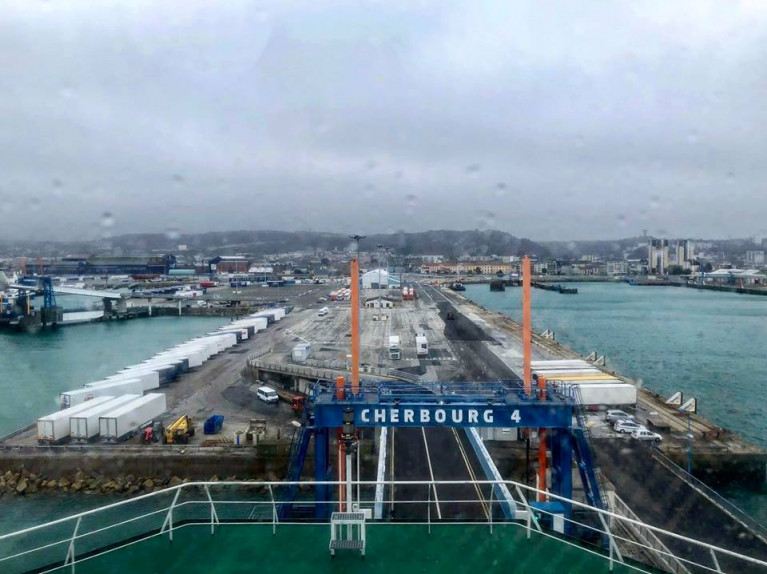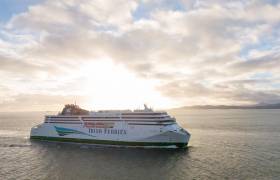Displaying items by tag: W B Yeats
Irish Ferries W.B. Yeats Resumes Its 'Seasonal' French Route Role Albeit With the Caveat of Covid-19
Irish Ferries W.B. Yeats which has been delayed in resuming Ireland-France 'cruiseferry' sailings by almost three months due to Covid19, has finally begun its 'seasonal' service role, writes Jehan Ashmore.
Afloat tracked W.B. Yeats depart Dublin Port yesterday for the first sailing to Cherbourg which was originally scheduled to have taken place in mid-March.
The ferry operator is continuously monitoring the evolving Covid19 situation in relation to passenger travel and has FAQ's through this LINK for consultation.
In addition Irish Ferries maintain links for essential travel such as repatriation and travel for carers/essential workers including medical staff.
As for freight traffic this has been consistent throughtout the ongoing health crisis in playing a critical role in the supply chain. This enables keeping supermarket shelves remain stocked and important pharmaceutical and medical supplies shipped.
Since the end of the 2019 season, ropax Epsilon has maintained the year-round operated service until Monday of this week. On this day, the Irish Government eased the Covid-19 restrictions under Phase 2, noting as for travel limits they be lifted from the end of June. For important travel information from the Dept of Foreign Affairs click here.
Also on that day Afloat tracked the arrival to Dublin of the chartered ropax ferry from France followed by W.B. Yeats from Holyhead, Wales. Later it would be the case for both cruiseferry and the 'no-frills' ropax make Dublin-Holyhead sailings as scheduled.
Also due to Covid19, all fastferry sailings by Dublin Swift that were due to resume seasonal services in April are cancelled.
W.B. Yeats had as scheduled served on the Ireland-Wales during the winter months in tandem with the route's main cruiseferry Ulysses and the aforementioned Epsilon. As for W.B. Yeats service on the Irish Sea short-sea route was longer then planned due to Covid19 that led unexpectingly into the Spring.
During that timeframe, Ulysses was away for several months for planned annual dry-docking but this year took place in Poland, where emission 'scrubbers' required by the EU Sulphur Directive to reduce pollution were installed. Such features are included in the 2018 German shipyard built W.B. Yeats though the superstructure was completed in Poland and towed by barge for heavy-lift transfer onto the hull.
W.B. Yeats return to service saw the cruiseferry today make an arrival to the French port located at the northern tip of the Cotentin Peninsula in Normandie. Its location is notably ideall for those intending to the visit the Normandy beaches involved in the WW2 where the D-Day Landings took place on 6th June 1944. Last year marked the 75th anniversary of the Battle of Normandy where Irish people served among the allied forces invasion of occupied France.
Returning to the present where at the French port is from where at the time of writing, W.B. Yeats departed bound for the Irish capital where it is due to make an arrival tomorrow morning before resuming sailing again at 1600hrs.
The Port of Cherbourg SAS is operated by the private company whose shareholders are the West Normandy Chamber of Commerce and Louis Dreyfus Shipowners. This established French shipping company through a subsidary LD Lines, was a big player mostly in the 2010's by rapidly expanding a route network involving France, UK, Ireland and Spain but is no longer in existance.
Among its earlier routes launched was Le Havre-Rosslare in late 2008 however this was short-lived as LD Lines ceased the service in the next year. However they chartered the route's ropax Norman Voyager to Celtic Link Ferries (now part of Stena Line). See recent related story here.
W.B. Yeats Makes Maiden Sailing from Dublin to Holyhead
#ferries - W.B. Yeats has finally made its maiden sailing this morning, as the €147m cruiseferry completed a Dublin-Holyhead crossing by arriving in the Welsh port before lunch-hour, writes Jehan Ashmore.
The impressive 1,885 passenger and crew/300 car/165 truck capacity newbuild ordered by ICG, parent company of Irish Ferries, which was beset with delays at the FSG shipyard in Germany, is now the biggest ever ferry to operate on the Irish Sea.
W.B. Yeats berthed in the Anglesea port though around an hour later than scheduled at 12.20 when Afloat tracked the ship dock in the outer port. This took place in advance of the original scheduled inaugural sailing planned for this Friday. In addition neither did 'freight' only sailings commence as scheduled, which were due to have begun more than a week ago.
This afternoon (14.00) the newbuild is to carry more passengers and freight with the first return leg of the route from Wales.
At around, 51,000 gross tonnage, W.B. Yeats will be a significant boost on the core Irish Sea route, which up till now was served primarily by Ulysses, which is due back in service this Thursday following annual dry-docking. In the meantime, ropax Epsilon also operates having been accompanied by Oscar Wilde, which made its final sailing on the route this morning with an arrival to Dublin Port.
In less than two months time, W.B. Yeats which was also built to serve between Ireland and France will operate the Dublin-Cherbourg route by entering service in mid-March.
Sailings on the direct Ireland-mainland Europe route is to take place just over a fortnight before the UK is due to leave the EU on the 29 March. With vehicle deck space for 2,800 freight lane metres, W.B. Yeats will be vital asset to ensure direct trade links for hauliers with an alternative of the UK landbridge and in whatever Brexit scenario arises.
As for passenger facilities, among them is the the Maud Gonne Bar & Lounge, Innisfree Club Class Lounge, The Hazel Wood Quiet Lounge and The Abbey & The Peacock Cinema & Lounge.
Accommodation comprises 440 cabins and of the luxury suites they feature a balcony along with a dedicated butler service. This feature will be particularly suited for the longer sea journey between the Irish capital and Normandy.































































